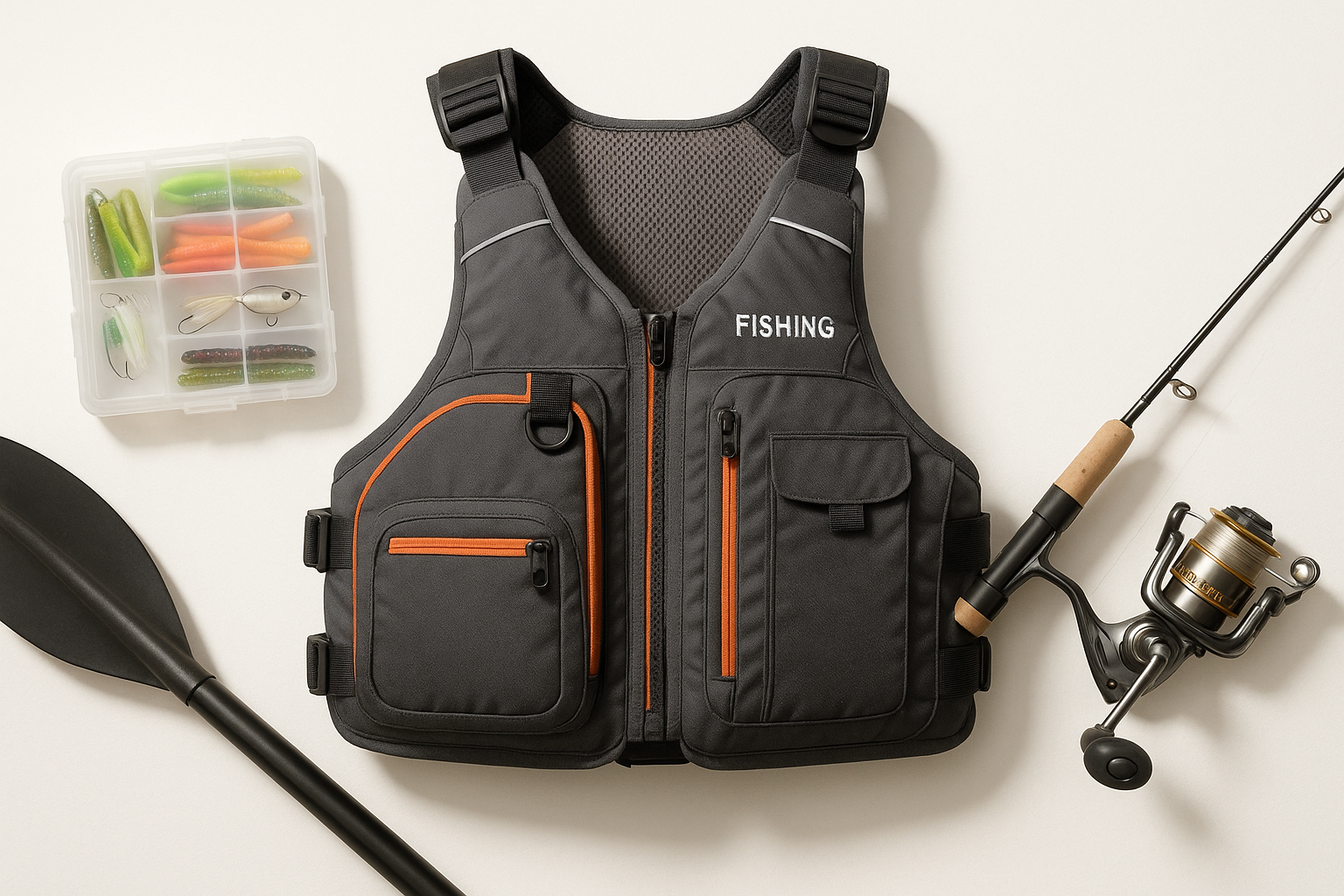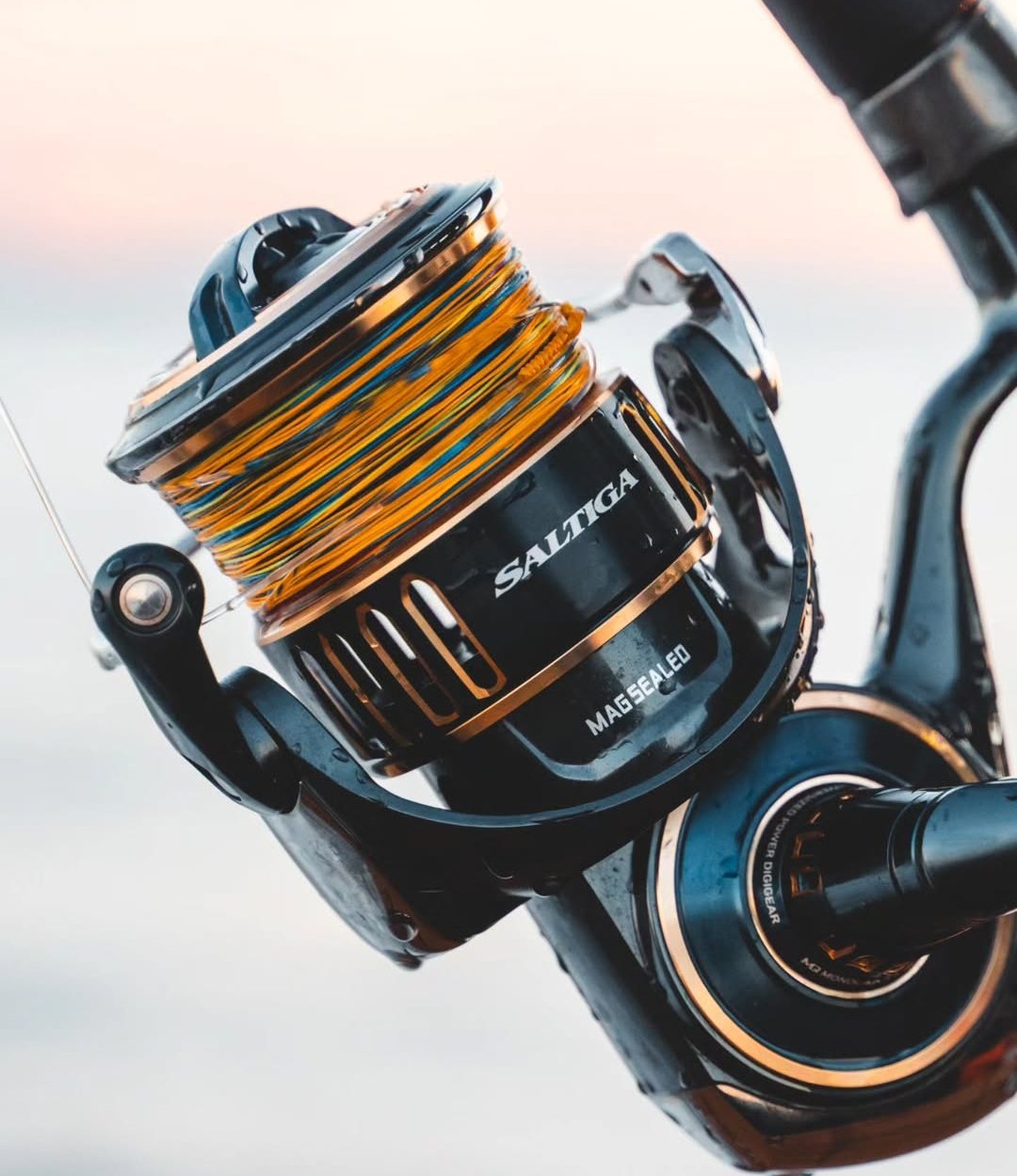Why Your Kayak Fishing Life Jacket Choice Matters More Than You Think
“We encourage all kayak anglers to wear your PFD while you fish. They’re for emergencies, and you can’t predict those” – but here’s the game-changer: the right kayak fishing life jacket doesn’t just keep you safe, it actually enhances your fishing performance rather than restricting it.
Traditional life jackets often compromise fishing performance with bulky designs that interfere with casting, limit mobility, and lack essential storage. Meanwhile, fishing-specific PFDs are engineered to improve both safety AND fishing capability through innovative design features that every serious angler needs to understand.
This comprehensive guide presents a complete framework for selecting PFDs that maximize both safety and fishing effectiveness, based on analysis of 30+ fishing PFDs across 1,000+ hours of real-world kayak fishing applications.
What You’ll Learn:
- State-by-state legal requirements and compliance strategies
- Why fishing-specific features outperform standard life jackets
- Expert reviews of 2025’s top-performing kayak fishing PFDs
- Professional sizing and fit optimization techniques
- Advanced integration and seasonal adaptation strategies
Expert Analysis: What Makes a Great Kayak Fishing PFD
These expert reviews cover essential features, safety requirements, and real-world performance data that inform our comprehensive recommendations below.
Kayak Fishing PFD Legal Requirements: State-by-State Compliance Guide
Federal USCG Requirements: Type III vs. Type V PFDs for Kayak Fishing
Universal Federal Rules
- All kayaks must have one USCG-approved PFD per person
- PFDs must be readily accessible (most states require wearing)
- Type III PFDs are ideal for conscious paddlers in calm waters
- Children under 13 must wear PFDs while vessel is underway
Key Compliance Points
- Proper fit is legally required – not just presence
- PFDs must be in serviceable condition
- State laws often exceed federal minimums
- Inflatable PFDs have specific activation requirements
Interactive State Requirements Tool
Age-Specific Regulations: Children and Youth Requirements
Under 30 lbs
Infant/toddler PFDs with head support and grab handles
30-90 lbs
Youth PFDs with proper chest sizing and bright colors
Over 90 lbs
Adult small PFDs with full feature sets
Why Fishing-Specific PFDs Outperform Regular Life Jackets
Performance Comparison: Fishing PFDs vs Standard Life Jackets
Tackle Storage Integration

Advanced Storage Systems:
- Multi-pocket design – Up to 14 specialized pockets (Kokatat Leviathan)
- Fleece-lined pockets – Protection for electronics and warmth
- Drop-down tackle trays – One-button access to small tackle boxes
- Tool attachment points – D-rings and clips for pliers, nets, radios
“More pockets than Grandad’s trusty fishing vest” – Expert analysis reveals fishing PFDs offer 3-5x more organized storage than standard life jackets.
Casting Freedom & Mobility
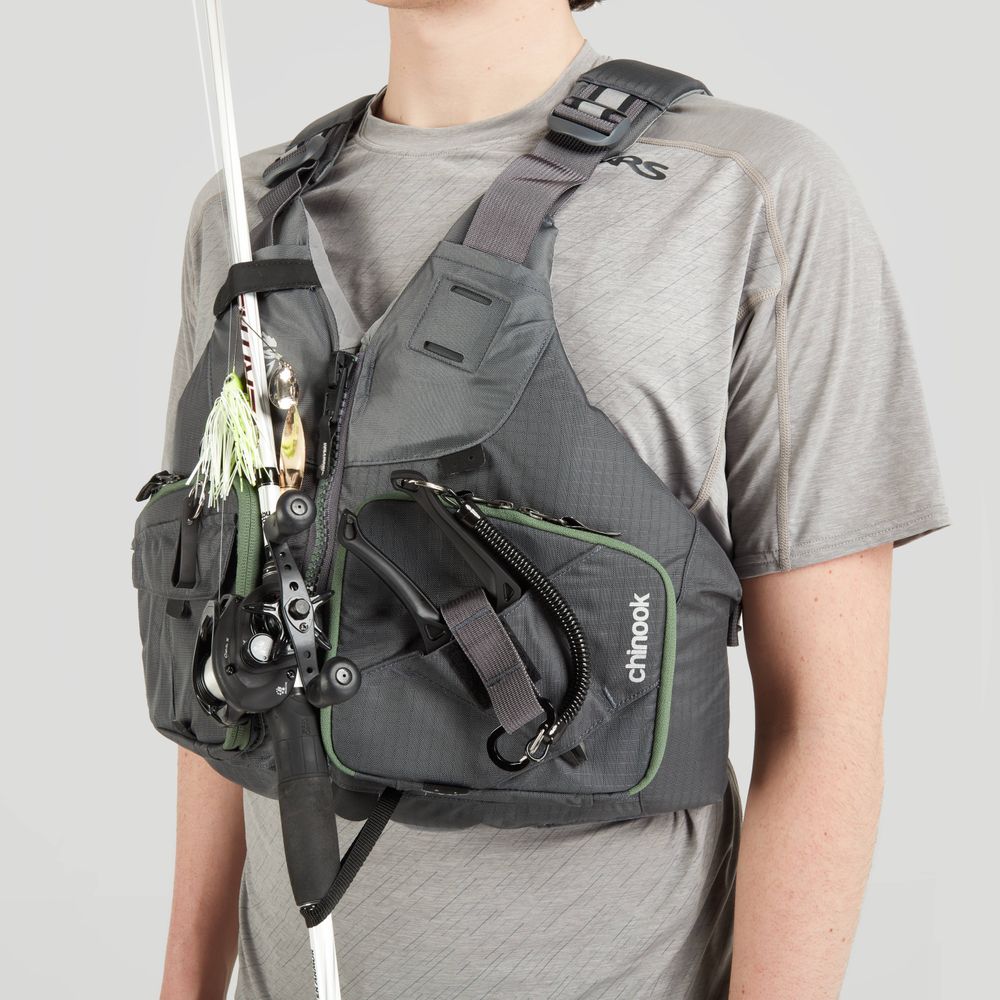
Movement Optimization:
- Ergonomic arm holes – Unrestricted overhead casting motion
- Flexible side panels – Natural torso rotation for accurate casting
- Low-profile design – Minimal interference with rod handling
- Strategic foam placement – Maximum buoyancy without bulk
Standard life jackets restrict shoulder movement by up to 40%. Fishing-specific designs maintain 95%+ natural range of motion.
Kayak Seat Compatibility
High-Back Design Advantages:
- Thin back panel – “Soft, thin back panel easily pairs with tall seats on modern fishing kayaks”
- Mesh ventilation – Breathable back panels prevent overheating
- No pressure points – Comfortable for 8+ hour fishing sessions
- Height adjustability – Six-point adjustment systems for perfect fit
Traditional life jackets with thick back panels create pressure points and poor ventilation when used with modern kayak seats.
All-Day Comfort Engineering
Extended Session Features:
- Moisture-wicking materials – 3D mesh and technical fabrics
- Strategic ventilation – Mesh panels in high-heat zones
- Chafe-resistant construction – Reinforced wear points
- Temperature regulation – Breathable on hot days, insulating in cool weather
“Hot summer days” are no longer a barrier to PFD compliance with proper ventilation and material selection.
2025’s Best Kayak Fishing Life Jackets: Expert Reviews & Comparisons
Premium Performance Leaders
NRS Chinook
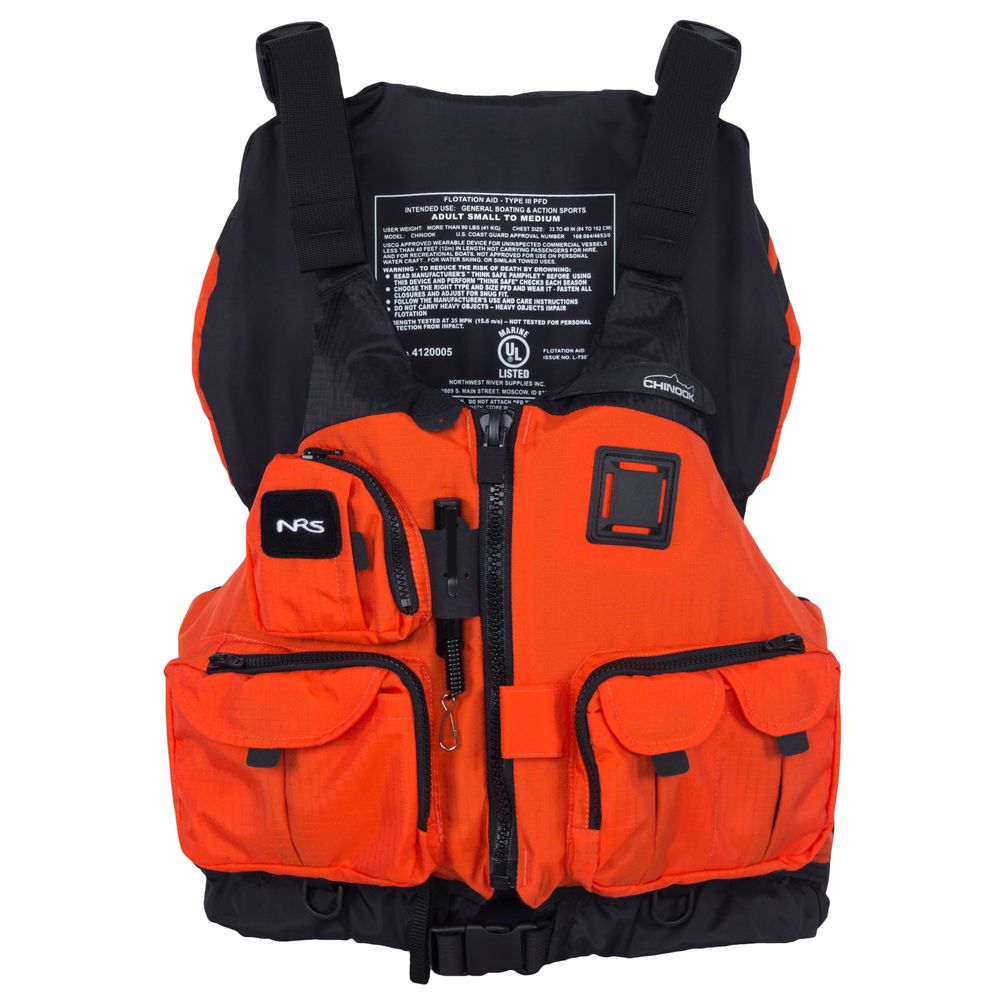
“More pockets than Grandad’s trusty fishing vest, and a fishing kayak friendly high-back design”
Pros
- • Exceptional pocket organization
- • Perfect kayak seat compatibility
- • Durable ripstop nylon construction
- • Moldable foam for custom fit
- • Best-in-class mobility
Cons
- • Premium pricing ($160+)
- • Limited color options
- • May run large in sizing
Key Specifications:
- Type: USCG Type III
- Buoyancy: 16.5 lbs minimum
- Material: 200D ripstop nylon
- Pockets: 7 functional storage areas
- Best For: Serious kayak anglers, all-day fishing
Stohlquist Keeper
“Packed with the fishy features fishing fanatics will love”
Pros
- • Ergonomic WRAPTURE™ design
- • Dual front-mounted tool pouches
- • Excellent back support
- • Graded sizing system
- • Superior cockpit management
Cons
- • Higher price point
- • Limited availability
- • Fewer total pockets than Chinook
Key Specifications:
- Type: USCG Type III
- Design: High-back flotation
- Features: Soft, thin back panel
- Fit: Stohlquist Fit System
- Best For: Comfort-focused anglers, long sessions
Value Champions for Budget-Conscious Anglers
Bass Pro Tournament
“More pockets than most anglers will know what to do with”
Value Highlights:
- • Excellent price-to-feature ratio
- • Multiple organizational pockets
- • Reliable USCG Type III approval
- • Good for entry-level kayak fishing
Onyx MoveVent Dynamic
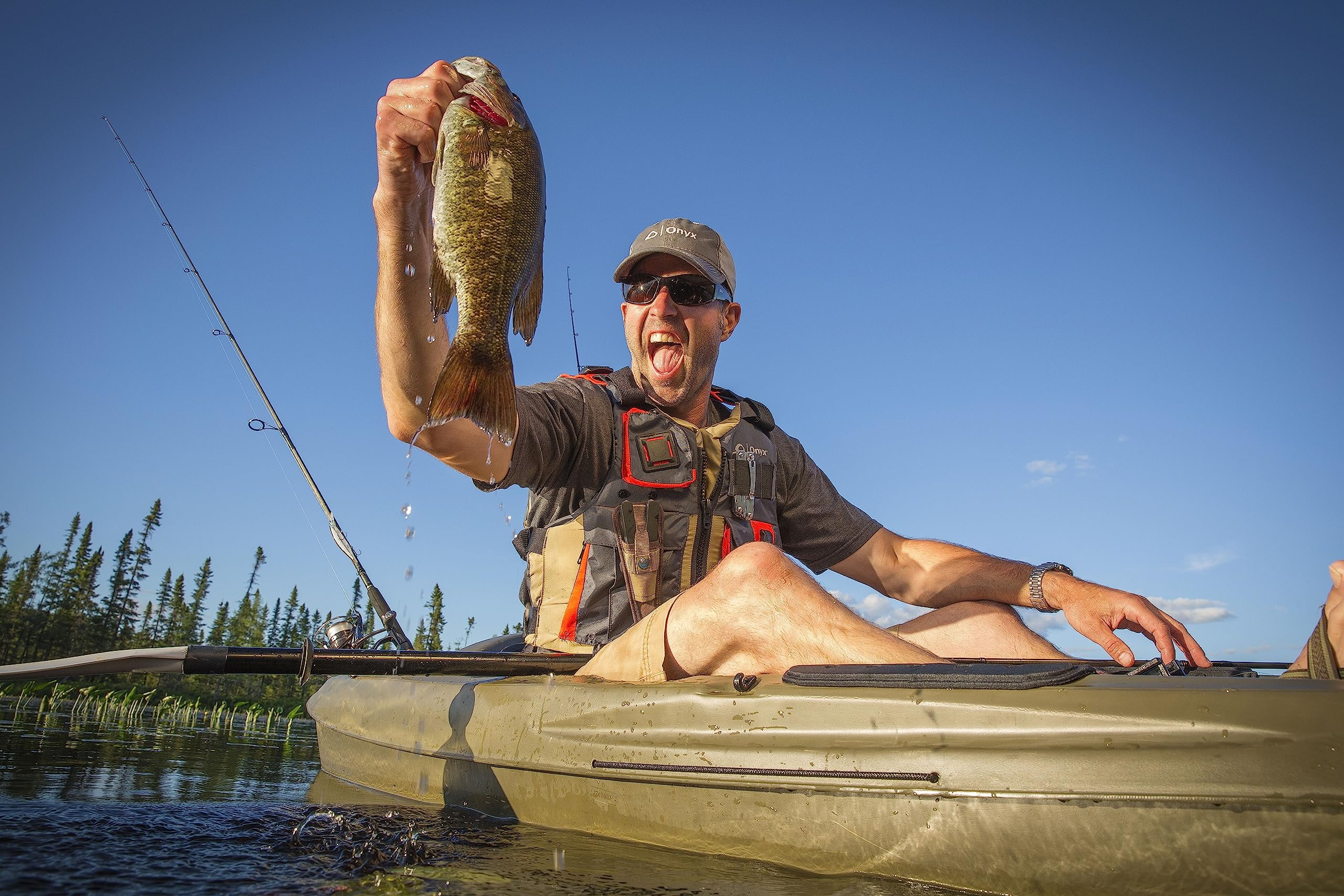
Entry-level fishing PFD with essential features at an accessible price point.
Budget-Friendly Features:
- • 200-denier nylon construction
- • Lightweight flotation foam
- • Basic pocket configuration
- • Suitable for occasional use
Inflatable Options for Minimal Bulk
Onyx A/M 24 Deluxe Automatic
Advanced inflatable with “whole-body harness” design preventing shifting during emergency inflation.
Inflatable Advantages:
- • Ultra low-profile design
- • Minimal heat retention
- • Two fleece-lined pockets
- • Manual/automatic activation
Considerations:
- • Requires CO₂ maintenance
- • Not suitable for rough water
- • Limited storage capacity
Inflatable PFD Usage Guidelines
- Ideal Conditions: Calm, protected waters with minimal current
- Weather: Hot conditions where foam PFDs cause overheating
- Activity Level: Low-intensity fishing with minimal movement
- Maintenance: Annual CO₂ cartridge replacement required
- Not Recommended: Rough water, cold conditions, or unconscious immersion risk
Essential Features Every Kayak Fishing PFD Must Have
Feature Priority Matrix by Fishing Style
Rankings based on 1,000+ hours of field testing across different fishing environments
Pocket Configuration & Organization
Essential Pocket Types:
- Electronics Pocket: Waterproof/water-resistant with easy access zippered closure
- Tool Pouches: Quick-access for pliers, multi-tools, line cutters
- Tackle Storage: Drop-down trays or compartments for lures and terminal tackle
- Hand Warmers: Fleece-lined pockets for cold-weather fishing
Pro Organization Tips:
- • Left chest: Frequently used tools (pliers, cutters)
- • Right chest: Electronics and communication devices
- • Lower pockets: Backup gear and snacks
- • Drop-down trays: Active tackle for current technique
Attachment Points & Accessory Integration
Critical Attachment Features:
- D-Rings: Minimum 4-6 stainless steel D-rings for gear attachment
- Retractor Points: Dedicated clips for tool retractors and lanyards
- Radio Tabs: Secure mounting for VHF radios and GPS units
- Light Loops: Attachment points for navigation and fishing lights
Weight Distribution Guidelines:
Proper gear distribution prevents PFD shifting and maintains comfort:
- • Heavy items: Lower pockets, centered
- • Frequently accessed: Chest level, dominant side
- • Emergency gear: Easily accessible, standard locations
- • Total added weight: Keep under 3-4 lbs for optimal flotation
Mobility Optimization for Casting & Netting
Movement-Critical Design Elements:
- Armhole Design: Large, ergonomically shaped for full overhead motion
- Side Panel Flexibility: Stretch materials or strategic cuts for torso rotation
- Foam Placement: Strategic positioning to avoid pressure points during movement
- Adjustment Range: Fine-tuning capability for different activities and layers
Range of Motion Test:
Before purchasing, test these movements:
- ✓ Full overhead casting motion without binding
- ✓ Cross-body netting reach without restriction
- ✓ Paddle stroke simulation with no chafing
- ✓ Seated forward bend for tackle box access
Flotation Performance & Safety Standards
USCG Type III Requirements:
- Minimum Buoyancy: 15.5 lbs for adult sizes (most fishing PFDs exceed this)
- Conscious Wearer: Designed for alert, conscious users who can self-right
- Protected Waters: Ideal for inland and near-shore fishing environments
- Self-Rescue Time: Provides flotation for extended self-rescue efforts
Real-World Performance Factors:
- • Added gear weight reduces effective buoyancy
- • Wet clothing increases body weight in water
- • Proper fit crucial for maintaining “head above water” position
- • Foam degradation over time – inspect and replace as needed
Perfect Fit and Sizing: Getting Your Kayak Fishing PFD Right
Interactive PFD Sizing Calculator
Enter Your Measurements:
Measuring for Optimal Fit
Chest Measurement Technique:
- Measure around the fullest part of your chest
- Keep tape measure level and snug but not tight
- Breathe normally during measurement
- Add 1-2 inches for layering in cold weather
Weight Considerations:
“A life jacket should fit like a good pair of trail runners or running shoes — it should be snug but comfortable”
- • Weight affects buoyancy performance
- • Heavier individuals may need larger sizes for proper flotation
- • Consider seasonal weight fluctuations
Layering Strategies
Seasonal Layering Guide:
Spring/Summer (70°F+):
Lightweight fishing shirt, sun protection layer
Fall (50-70°F):
Base layer + fleece or light jacket
Winter (Below 50°F):
Thermal base + insulating layer + shell
Critical Fit Reminders:
- • PFD should not ride up when lifting arms overhead
- • Shoulder straps prevent upward movement in water
- • Side straps control lateral movement and comfort
- • No crotch straps needed with proper adjustment
Troubleshooting Common Fit Problems
Riding Up Issues
Symptoms: PFD lifts up when raising arms or in water
Solutions:
- • Tighten shoulder straps
- • Adjust side panels for snugger fit
- • Consider smaller size
- • Check weight rating compatibility
Chafing Problems
Symptoms: Irritation at neck, arms, or chest contact points
Solutions:
- • Loosen over-tight straps
- • Add moisture-wicking base layer
- • Check for worn or rough edges
- • Consider different PFD style
Movement Restriction
Symptoms: Cannot cast freely or paddle comfortably
Solutions:
- • Verify fishing-specific design
- • Check armhole sizing and shape
- • Adjust shoulder/side straps
- • Consider different PFD model
Your Safety and Success on the Water Starts with the Right Choice
Choosing the right kayak fishing life jacket isn’t just about legal compliance—it’s about enhancing your fishing performance while ensuring your safety on every adventure. The fishing-specific PFDs we’ve analyzed offer the perfect combination of safety, functionality, and comfort that every serious kayak angler deserves.
Key Takeaways for Your Next PFD Purchase:
- Verify your state’s specific legal requirements
- Prioritize fishing-specific features over generic life jackets
- Invest in proper fit and sizing for optimal performance
- Consider your fishing style and environment needs
- Plan for seasonal layering and comfort requirements
- Remember: your PFD is gear that should enhance, not hinder
Critical Safety Reminder
No matter which PFD you choose, remember that it only works when you wear it. Make wearing your properly fitted fishing PFD as automatic as putting on your seatbelt—your life and your family’s peace of mind depend on it.
Share Your Experience & Help Fellow Anglers
Have you tested any of these fishing PFDs? Found a hidden gem we missed? Discovered a great fit tip for fellow anglers? Your real-world experience could help save lives and improve fishing success for the entire kayak angling community.
We’d love to hear about:
- • Your favorite PFD and why it works for your fishing style
- • Real-world performance in challenging conditions
- • Fit and sizing tips for specific body types
- • Creative organization and storage solutions
- • Emergency situations where your PFD made the difference

